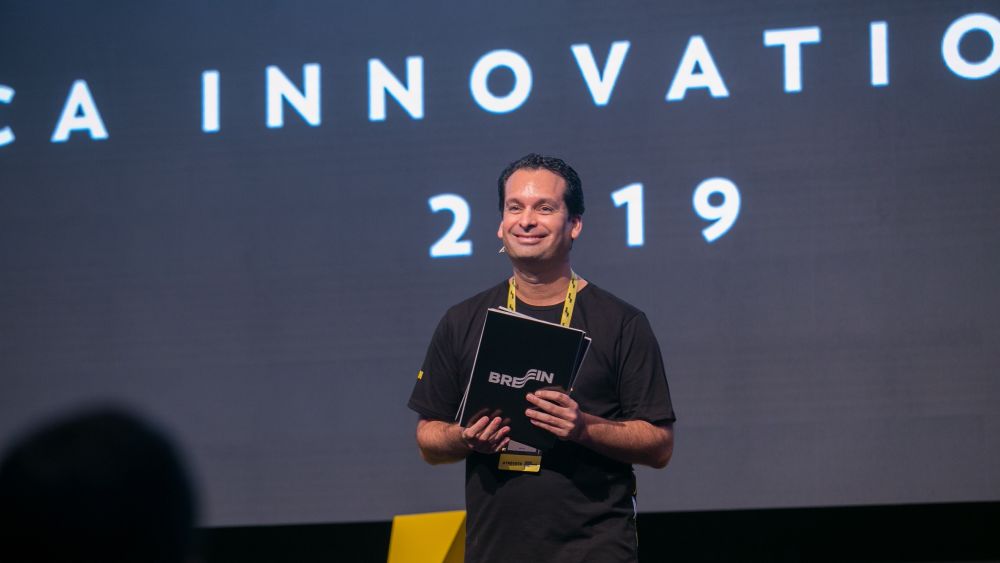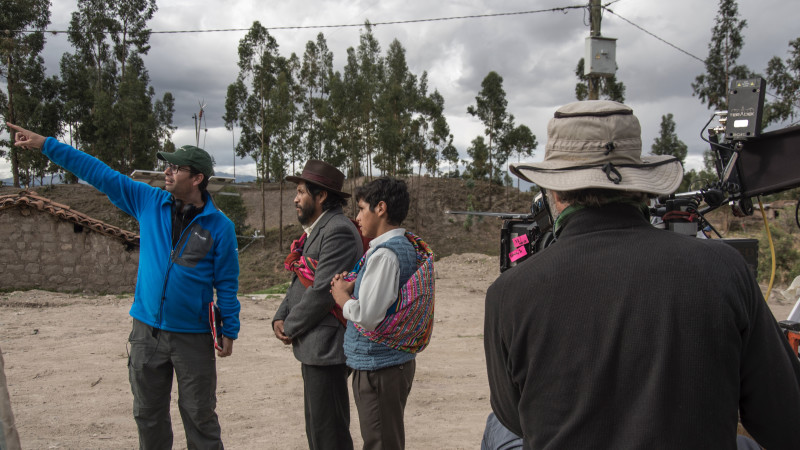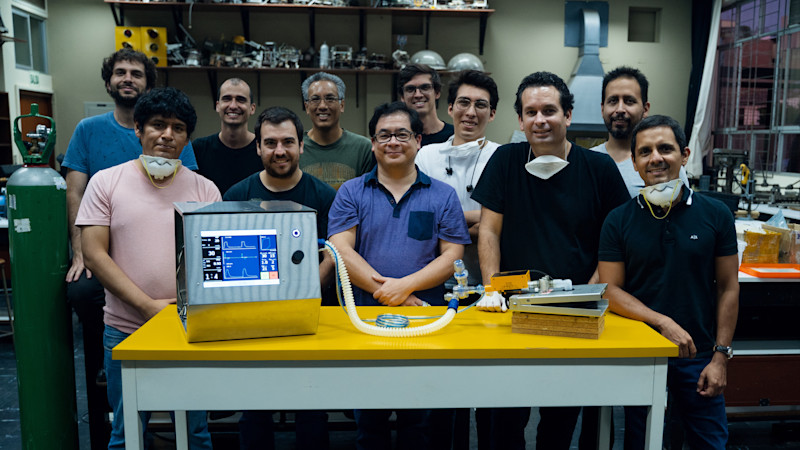- Iterate
- Meet The Team
- How BAFTA-Nominated Director Alvaro Delgado Successfully Created Peru's Largest Innovation Hub
How BAFTA-Nominated Director Alvaro Delgado Successfully Created Peru's Largest Innovation Hub
Known locally in Peru as a highly-accomplished and well-respected innovation expert and internationally as a breakout film director, Alvaro has often been mistaken for being two different people. For many, it was difficult to fathom that the co-founder and CEO of BREIN, the innovation hub of one of Peru’s leading conglomerates, Grupo BRECA, with an annual revenue of $5 billion, was also a rising film director during his ‘spare’ time.

What do filmmaking and innovation have in common? For Alvaro Delgado Aparicio, a great deal.
Known locally in Peru as a highly-accomplished and well-respected innovation expert, and internationally as a breakout film director, Alvaro has often been mistaken for being two different people. For many, it's difficult to fathom that the co-founder and CEO of BREIN, the innovation hub of one of Peru’s leading conglomerates, Grupo BRECA, with an annual revenue of , is also a rising film director during his ‘spare’ time.
Alvaro’s life and career can be described as a series of fortunate events resulting from choosing the road less traveled.
At 13-years-old, he became obsessed with movies, more specifically the scripts behind them. He would frequent the movie theatre across from his London flat and watch ten films per week. After studying Business and Economics at London University and then completing a Masters in Organizational Psychology at the LSE, he returned to Perú and landed his first job at leading management consulting firm Grupo APOYO. There, he specialized in innovation and change management transformational projects while working for companies like SABMiller, Hewlett Packard and Toyota, among others. He then went on to complete his MBA from MIT and a Sloan fellowship in innovation at the same university.
Alvaro says that he was always telling colleagues and clients to, “jump into the pool” and experiment and learn through risks, until one day during a time of great introspection, his wife told him he should take his own advice with his personal hobby and jump into the pool himself. This simple, yet unassuming advice was what ultimately led Alvaro to pursue his filmmaking passion in parallel with his business career. His short film debut, “The Companion,” premiered at the Sundance Film Festival and was selected in more than 80 film festivals around the world.
In 2015, after being awarded the Eisenhower Fellowship of Innovation, chaired by Colin Powell, Alvaro took a sabbatical year to spend in Ayacucho. There, he immersed himself in the Andes culture to write and direct his first feature film, “.” The movie, which premiered in the Berlin International Film Festival, went on to win over 50 prestigious awards on the film festival circuit and nominations in the British (BAFTA) and Chinese Academy Awards, among others. “Retablo” was then acquired by Netflix.

Shortly after, Alvaro was invited to create and lead the BREIN innovation hub for conglomerate BRECA. No small task for a Group founded over 130 years ago and operating in sectors including insurance (RIMAC), healthcare (Clinica Internacional), real estate (Urbanova), mining (Minsur), fishing (TASA), painting (Qroma), cement (�ѱ��ó��), banking (BBVA Perú), and others.
Alvaro took The Org behind the scenes to see how he creatively and successfully directs innovation for one of the biggest business conglomerates in Latin America.
“Innovation is not the same as innovating,” he said. “While innovation is a new idea, solution or creation that generates impact by breaking paradigms, transforming culture, and instilling new capabilities in people, innovating requires identifying the challenges that really matter and lubricating the organization’s willingness to make impact happen.”
For Alvaro, there are three main types of impact that any innovation has to contemplate: economic impact, easily quantifiable and often finance related; strategic impact, not easily quantified but critical for organizational sustainability in the long term; and induced impact, also known as the positive externalities which bring benefits to the company and its stakeholders that were not initially contemplated.
"Leaders and companies can’t afford to be short sighted with innovation and only aiming for EBITDA,” he says “Strategic and induced impact are equally or more important than the economic ones. Transforming lives and improving the well-being of people is our purpose."
BREIN was conceived with a clear mission to untap and develop diversity and innovation potential within BRECA´s operating companies. According to Alvaro, “BREIN’s first three years have been focused on laying the building blocks for this journey and fomenting the notion that everyone has the potential to innovate.”
A series of systematic and ongoing experiments have allowed BREIN to build trust and complicity with multiple company leaders while creating the necessary skills, capabilities and mindset shifts within the Group. These experiments have been unusual approaches that challenge the traditional way of running the multiple businesses within BRECA. For example:
- QROMA, the conglomerate’s paint company, ran a data analytics project using AI to empower their sales force to have a better understanding of client’s unique preferences.
- The fishing division, TASA, launched a fishing “Waze” system to optimize the fleet route in order to improve the quality and freshness of the newest catch.
- Minsur (mining) collaborated with international startups to experiment and iterate with nano-bubble systems in their mining practices to optimize tin recovery.
- More recently, BREIN partnered with the public, private and academic sector in Peru to orchestrate the design, production and distribution of 400 emergency ventilators to help fight COVID-19.
“Corporate innovation is only possible if three main ingredients are in place: passionate, courageous and very resilient individuals; strong multidisciplinary teams; and organizations that truly facilitate and nurture the transformational journey,” Alvaro says. “If one of these ingredients fails, innovation will not happen.”

The successful execution of a pipeline of multiple experiments and projects comes from a diverse team of highly specialized and learning driven individuals that compose the five BREIN labs:
- Human Centered Design Lab: Responsible for helping BRECA’s companies connect and understand customer and user needs (through design thinking methodologies and organizational change techniques) to discover key insights and implement unique solutions that keep generating value.
- Tech & Digital Lab: Whose objective is to develop foresight capabilities to identify key emerging disruptive technologies and prove their viability through rigorously designed experiments to test and implement them within business units operations.
- Centre for Advanced Analytics: Leveraging data to generate solutions, products and services based on AI to create value, mitigate risk, gain competitive advantage and allow for better and agile decision-making.
- Open Innovation Lab: Focused on collaborating with tech startups from all over the world and the broader ecosystem to partner, experiment and scale, solving specific Group challenges.
- BREIN Academy: A parallel and safe space to fail, fail better and fail faster in order to learn. Over 3,500 BRECA employees from all companies have completed diverse, unique and non-traditional action learning programs resulting in an innovation movement to make things happen and generate impact.
“Although each lab has a team and a specialized framework for creating and transferring specific knowledge and skills to the business units, it’s in the synergies between them that true innovation happens,” he said. “To accelerate momentum through the projects, we created ‘innovation residencies,' where three to five people from the labs live in a business unit for at least one year and begin incubating and developing these experiments in collaboration with direct employees.”
One of BREIN’s principles from their own manifesto is that they don’t work for the Group's business units, they work with them. Cohesiveness is crucial to successfully implementing innovation and avoiding an “immune system response.” Alvaro shares four key aspects he evaluates and assesses to be able to create valuable change and transformation:
1. Organization Readiness: How ready is the organization in terms of culture, mindset, skills and capabilities to create impact?
“Capacity building is like a positive virus that you inject into the organization and feed off small experiments that grow over time.”
2. Innovative Mindset: Does the organization have an appropriate and nurturing environment conducive for experimentation, iteration and learning?
*“One of the things that I like the most about a good innovation ecosystem is that it is similar to what happens in a film set. In both you have a collaborative structure where you can experiment, fail quickly, iterate AND end up creating something amazing. The best scenes in a movie do not come out in the first take; on average they come out in take number 12 because there is a systematic and creative learning that takes place with iteration.” *
3. Diversity Mentality: How does the organization really work and cope with diversity?
“Innovation, like movies, cannot be done individually, and neither can it be done with a set of only directors, or actors. It’s a creative collaborative process that needs a cohesion of multiple skills and talent, real respect and tolerance for diverse personalities, backgrounds, identities and perspectives to discover what is waiting to be discovered.”
4. Leadership Willingness: Does leadership really believe in it? How much time will the CEO invest in the project?
*“One of key criteria to starting a project is the willingness of the CEO and what role he or she will play. The creation of an algorithm or a new product prototype is not the challenging part, it’s the navigation through the system and the resistance of the status quo where the complexity lies. If the CEO is part of lubricating the system with generosity and empathy, real impact will happen.” *
After three years of learning and generating specialized capabilities, BREIN is now entering a ‘take-off stage,’ as Alvaro calls it, where new disruptive business models will be explored marking the path forward for the innovation hub and the Group.
“In this new stage, we need to continue developing key capabilities in a wider spectrum, strengthening our disciplines and communities of practice so we can be bolder and more daring about innovation and disruption,” he says. “It is time to go from a short film to a feature film."
--
The Org is a professional community where transparent companies can show off their team to the world. Join your company here to add yourself to the org chart!



